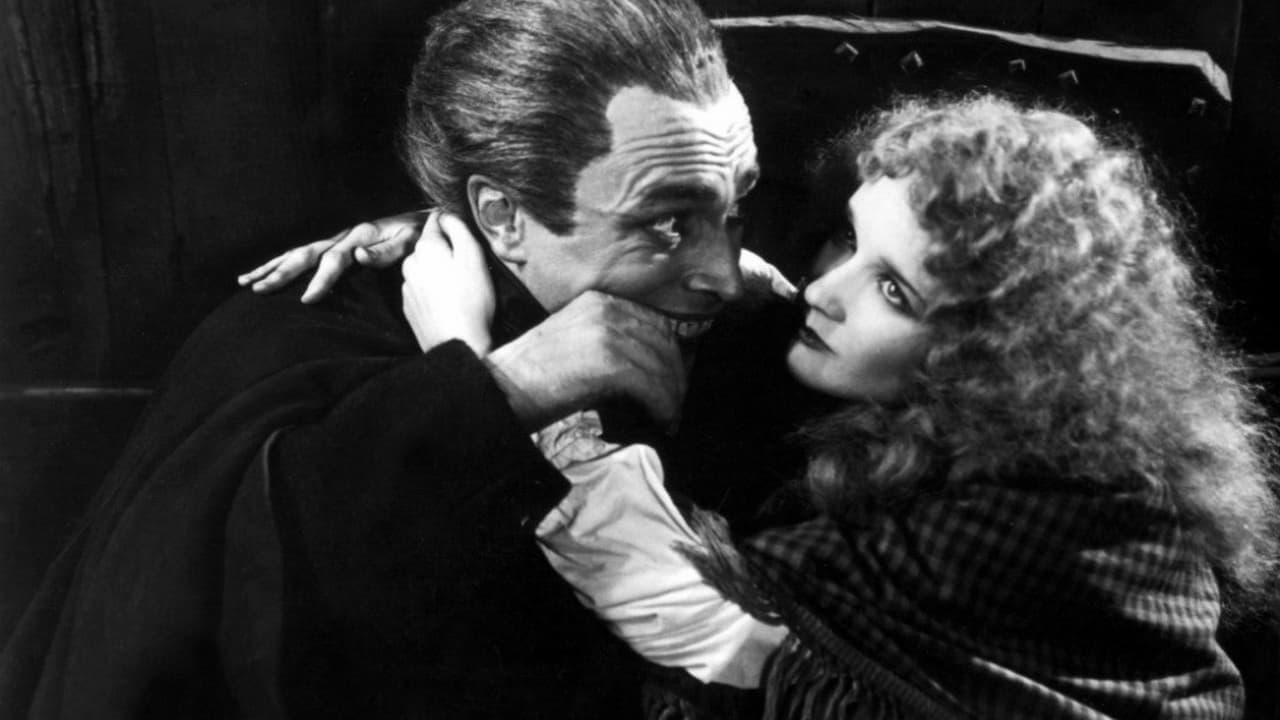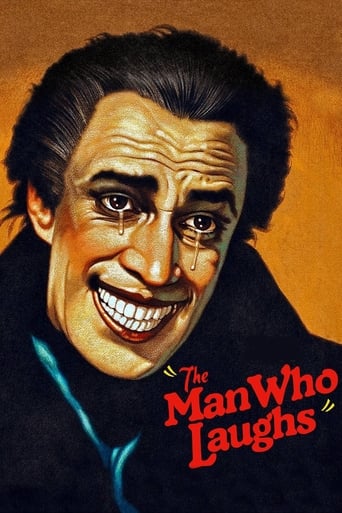



The movie's neither hopeful in contrived ways, nor hopeless in different contrived ways. Somehow it manages to be wonderful
View MoreVery good movie overall, highly recommended. Most of the negative reviews don't have any merit and are all pollitically based. Give this movie a chance at least, and it might give you a different perspective.
View MoreThe storyline feels a little thin and moth-eaten in parts but this sequel is plenty of fun.
View MoreIt is encouraging that the film ends so strongly.Otherwise, it wouldn't have been a particularly memorable film
View MoreThe man who laughs is one of the saddest movies I've seen in my life, one of those deep movie that leaves you thinking about it for several days. The expressiveness of the eyes of Gwynplaine have shaken me to tears.Despite being made in 1928, with technology and the ways of the time, so distant from the current ways, these differences do not interfere at all. The same has happened to me when I see "Citizen Kane" (1941) by Orson Welles. So "The man who laughs" is a great choice for those who are looking to enter the world of classic films.
View MoreI saw this as the main feature of the annual Oct. 30th presentation of "Silents in the Cathedral", a joint presentation of Grace (Episc.) Cathedral, our Public Library, & probably staff of the Kansas Silent Film Festival (presented annually in Feb.). Some of the below is from information presented before the show."The Man Who Laughs" is based on Victor Hugo's 1869 novel of the same name. Universal studio, having just lost their star, Lon Chaney ("Hunchback of Notre Dame", etc.) to MGM, imported the German director Paul Leni and star Conrad Veidt to compensate with this extravagant historical costume/action/horror/romance film. While it currently earns 8/10 stars on IMDb's rating and is considered very influential to film making, it wasn't particularly financially successful. It opened on the cusp of the talkies. Universal considered dubbing voices and re-releasing it but Veidt spoke little English plus the wire prosthesis Veidt wore to keep his face in such a hideous grin interfered with speech. (Veidt's facial appearance served as the model for "The Joker" in Batman comics, see the cover of the DVD.) The story takes place during James II's turbulent reign in England.A nobleman--opposed to this king's policies and actions--flees the country but is captured during his secret return attempting to find his young son, Gwynplaine.The king orders this nobleman killed for insubordination and, in addition, on the malicious advice of an associate, that his son's face be surgically altered to perpetually present a laughing appearance in re: his father's insubordination and death.The boy Gwynplaine becomes separated from his caretakers in a snow storm and, while seeking shelter, he finds a baby being held in her dead mother's arms. He rescues her, putting her under his jacket for protection from the cold, and he finds a house that offers them warmth and safety.The baby girl (Dea) is blind; she and Gwynplaine are raised by a philosopher, teacher, who eventually forms a traveling show that tours towns and fairs, presenting a play featuring Gwynplaine & Dea (played as an adult by Mary Philbin, who has grown to be very beautiful). Dea loves Gwynplaine and vice-versa but he is reluctant to marry her because, since she is blind, she can't know how terribly distorted his face is to everyone else.Dea argues against these fears saying that God has granted her blindness so she can see Gwynplaine as he truly is.In time, King James II is replaced by Queen Ann.A pretty duchess, strong-willed and somewhat disobedient to her Queen, lives in the property formerly owned by Gwynplaine's father and to which Gwynpaine, therefore, is the rightful heir.There are malicious, evil characters also involved with the queen and who continually try to hurt Gwynplaine. As punishment for the duchess's disobedience, they advise the Queen to order the duchess and Gwynplaine to marry (and banish Dea and her caretakers from England). The Queen does so and Dea is heartbroken.Gwynplaine rebels against this edict.He's ordered to be arrested but he resists and escapes; a prolonged exciting chase ensues.During this, the family dog--which has always been close to Dea and Gwynplaine--comes to the rescue and manages to achieve what we hope will be a far happier ending than the one ordered by the Queen. (These scenes also may well have served as the model for the later, "What, Lassie? Timmy's in the well and needs help?") And the film's ending IS happier! It's a heart-tugging, exciting, fun show.Several times, both at the conclusion as well as the section leading up to it, our audience erupted into loud clapping and whistling.It's very worth seeing; the whole cast is superb, especially Veidt who carries the film and very effectively conveys the sorrow he feels while bearing his perpetual wide grin. IMO although it's not quite as good as the superb "Sunrise, A Song of Two Humans"(1927), still it is a great, very touching, influential film.
View MoreTHE MAN WHO LAUGHS starts exceptionally well and definitely gets your attention. In many ways, it seems reminiscent of a Rafael Sabatini novel--the same guy who brought many adventure tales to the screen (such as CAPTAIN BLOOD, SCARAMOUCHE and THE BLACK SWAN), though the actual story was by Victor Hugo. King James II of England (a particularly bad king according to most history books) has arranged for the death of an enemy in a very brutal scene. And, in a nasty move, he has the face of his enemy's young son, Gwynplaine, carved into a permanent smile by some bizarre group of evil gypsies. However, the boy does survive and makes his way in the snow to the wagon of a nice gypsy (the non-face carving kind) and on the way he discovers a baby (Dea) in the arms of a dead woman.Years pass and now Gwynplaine is a famous adult--famous for his stage act along with his adopted gypsy dad and the grown baby--now a gorgeous but blind lady (Mary Philbin). It's pretty obvious Gwynplaine and Dea are in love but fate steps in when a current monarch, Anne, finds out that Gwynplaine is the heir to a title. He is kidnapped and instated as a peer in the House of Lords--though it doesn't go well for Gwynplaine. He'd much rather have his old life and Dea. Tune in for yourself to find out what happens.In many ways, this film is the pinnacle of silent films in America. It debuted very late in 1928 and had it been made just a few months later, it would likely have been a sound film (though how they could have done this with the facial appliance Conrad Veidt had to wear for the title role would have been a problem). But, as it was made in this transition period, Universal added a soundtrack along with sound effects and a song--making it a semi-talkie. Additionally, the cinematography is just lovely and the story very engaging. One of the better silent films and one that has somehow been almost forgotten over the years.By the way, the DVD from Kino is exceptional. Not only is the print nearly pristine but there are lots of extras on the DVD that would make this a nice addition to any home library.
View MoreThe Man Who Laughs is one of the best love stories of the silent era and it is in essence the best Lon Chaney movie not starring Lon Chaney. Conrad Veidt gives the performance of his career as Gwynplaine, a man of royal blood who is punished for the sins of his father. He has a horrible grin carved into his face so he is forever smiling on the outside or "Laughing at his fool of a father" Gwynplaine is given this horrible scar by the infamous gypsies the Comprachios, he is abandoned by them and is taken in by a carnival traveler called Ursus along with a poor blind baby who is named Dea. Gwynplaine grows up a shattered man with no sense of pride in his life other than his deep love for Dea. He feels as if he doesn't deserve Dea and has to become something more than the "clown" the world has cruelly dubbed him as.Geez those who think Gwynplaine is the inspiration for the Joker couldn't be farther from the truth. Visually yes but Gwynplaine is the only truly decent character in this film. The film is also miscorrectly labeled as a horror film, it is actually a tragedy in my opinion. However the classification of a horror film isn't far off, Paul Leni deeply roots the set and make-up design in his natural German Expressionism. The shadows and set designs are beautiful and is really the last example of this masterful method of film-making. No star knows how to better match this than Conrad Veidt, the star of the masterpiece The Cabinet of Dr Calagari. This performance is breathtaking, every scene he is in he dominates. His on screen presence is huge and overwhelming in a great way. It's a genuinely touching story and we feel deeply for Gwynplaine when we might not feel as much for other characters.
View More